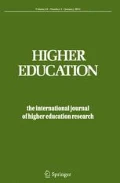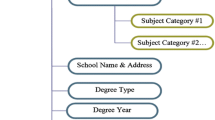Abstract
This article reports on a study of senior academics’ views of their disciplinary and interdisciplinary affiliations. It questions the idea that academics have a firm and fixed disciplinary identity from which they then act and suggests that academic work in the contemporary university challenges and changes how individuals view their disciplinary affiliation. The article provides empirical data that lends weight to critical questioning of anthropological metaphors, which have tended to dominate discussions of disciplinarity. It suggests that contemporary understandings of disciplinary and interdisciplinary identity need more fluid metaphors and models; ones that can capture the shifting and questioning uncertainties that give expression to the rhetorical and reflexive nature of academics’ disciplinary affiliations. The article explores the implications of a dominant emphasis on disciplinary relationships for understanding disciplinarity and interdisciplinarity and examines the practical implications for structures and systems that are designed to enhance and evaluate research and teaching within higher education.
Similar content being viewed by others
References
Bauman, Z. (2006). Liquid life. Cambridge: Polity Press.
Becher, T. (1989a). Academic tribes and territories: Intellectual enquiry and the cultures of disciplines. Buckingham: Society for Research into Higher Education and the Open University Press.
Becher, T. (1989b). Historians on history. Studies in Higher Education, 14(3), 263–278.
Becher, T. (1990). Physicists on physics. Studies in Higher Education, 25(1), 3–19.
Becher, T., & Trowler, P. (2001). Academic tribes and territories: Intellectual enquiry and the cultures of disciplines (2nd ed.). Buckingham: Society for Research into Higher Education and the Open University Press.
Biglan, A. (1973). The characteristics of subject matter in different academic areas. Journal of Applied Psychology, 57(3), 195–203.
Bourdieu, P. (1990). Lecture on the lecture. In P. Bourdieu (Ed.), The logic of practice. Cambridge: Polity Press.
Bourdieu, P., & Wacquant, L. J. D. (1992). An invitation to reflexive sociology. Cambridge, UK: Polity Press.
Brew, A. (2001a). The nature of research: Inquiry in academic contexts. London: RoutledgeFalmer.
Brew, A. (2001b). Conceptions of research: A phenomenographic study. Studies in Higher Education, 26(2), 271–285.
Brew, A. (2006). Research and teaching: Beyond the divide. London: Palgrave Macmillan.
Donald, J. G. (1990). University professors’ views of knowledge validation processes. Journal of Educational Psychology, 82, 242–249.
Henkel, M. (2000). Academic identities and policy change in higher education. London: Jessica Kingsley Publishers.
Huber, L. (1990). Disciplinary cultures and social reproduction. European Journal of Education, 25(3), 241–261.
Huber, M., & Morreale S. P. (2002). Disciplinary styles in the scholarship of teaching and learning: Exploring common ground. Menlo Part: Carnegie Foundation for the Advancement of Teaching.
Klein, J. T. (1996). Crossing boundaries: Knowledge, disciplinarities and interdisciplinarities. Charlottesville: The University Press of Virginia.
Lucas, L. (2006). The research game in academic life. Open University Press and the Society for Research into Higher Education.
Lyon, A. (1992). Interdisciplinarity: Giving up territory. College English, 54(6), 681–693.
Nowotny, H., Scott, P., & Gibbons, M. (2001). Re-thinking science: Knowledge and the public in an age of uncertainty. Cambridge: Polity Press.
Pinch, T. (1990). The culture of scientists and disciplinary rhetoric. European Journal of Education, 25(3), 295–304.
Quinlan, K. M. (1999). Commonalities and controversy in context: A study of academic historians’ educational beliefs. Teaching and Teacher Education, 15, 447–463.
Stoecker, J. L. (1993). The Biglan classification revisited. Research in Higher Education, 34(4), 451–464.
Vincenti, V. B. (2005). Family and consumer sciences university faculty perceptions of interdisciplinary work. Family and Consumer Sciences Research Journal, 34(1), 80–103.
Wareing, S. (2006). How students learn in their subjects; identifying models. Paper presented at SEDA Spring Conference Advancing Evidence-Informed Practice in HE Learning, Teaching and Educational Development, Liverpool, UK, 8–9 June.
Ylijoki, O.-H. (2000). Disciplinary cultures and the moral order of studying: A case study of four finish university departments. Higher Education, 39, 339–362.
Author information
Authors and Affiliations
Corresponding author
Rights and permissions
About this article
Cite this article
Brew, A. Disciplinary and interdisciplinary affiliations of experienced researchers. High Educ 56, 423–438 (2008). https://doi.org/10.1007/s10734-007-9102-4
Received:
Accepted:
Published:
Issue Date:
DOI: https://doi.org/10.1007/s10734-007-9102-4



